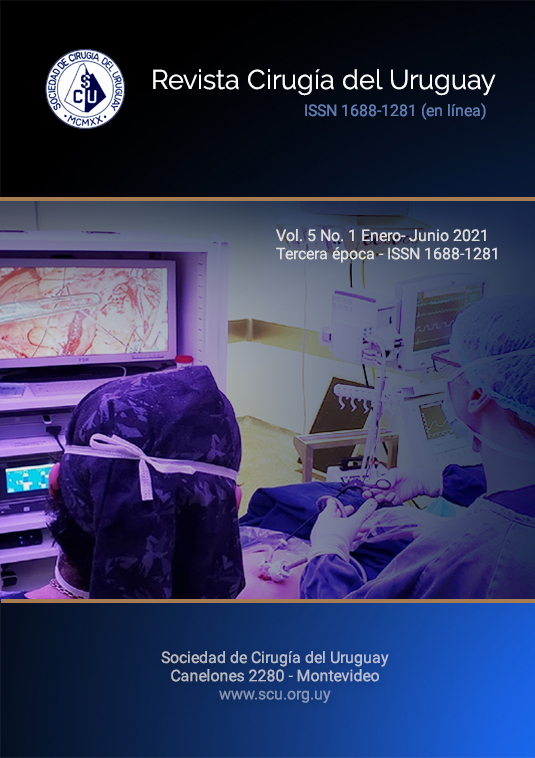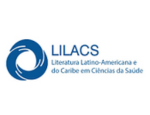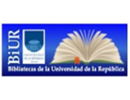Surgical practice in Uruguay during the COVID-19 Pandemic
Analysis of qualitative and quantitative aspects of its initial phase.
DOI:
https://doi.org/10.31837/cir.urug/5.1.7Abstract
Due to the SARS-CoV-2 infection pandemic in Uruguay, guidelines and recommendations were established that radically modified the usual surgical procedures. These measures were based on recommendations based on previous international experience, tending to perform only urgent / emergency surgeries, oncological patients and those who cannot be postponed. Objective. Analyze the impact of the COVID-19 pandemic on the practice of surgical specialists in our country.
Material and methods. A survey was carried out and disseminated through the scientific surgical societies of Uruguay, which was kept open for a period of 10 days (April 20 to 30, 2020), collecting a total of 262 responses, of which 212 were complete. .
Results: 52% of those surveyed performed scheduled surgeries and 55% performed video-assisted approaches; 51% of those who performed surgeries denied having taken additional protective measures during them.
Twenty-three (9%) of the specialists operated on patients suspected of carrying Covid. 19 and 3 (1.1%) positive COVID-19 cases.
57% considered themselves "partially trained" and 21% "poorly trained" (21%), while 19% defined themselves as "fully trained" for the use of protection elements.
Conclusions: High compliance with the suspension measures for coordination surgeries was verified (decrease of 82). Surgeries in patients with COVID-19 were exceptional and the frequency of cases with suspected disease was low.
The excess of information and the existence of multiple protocols have determined considerable heterogeneity in the implementation of protection measures and low participation in training activities.
Downloads
Metrics
References
2. CovidSurg Collaborative, Nepogodiev D, Bhangu A. Elective surgery cancellations due to the COVID-19 pandemic: global predictive modelling to inform surgical recovery plans. Br J Surg [Internet]. 2020 May 12 [consultado2020 May 17]; Disponible en: http://www.ncbi.nlm.nih.gov/pubmed/32395848
3. CEPAL. América Latina y el Caribe ante la pandemia del COVID-19: efectos económicos y sociales | Repositorio Digital | Comisión Económica para América Latina y el Caribe [Internet]. 2020 [consultado 2020 May 17]. p. 1–15. Disponible en: https://repositorio.cepal.org/handle/11362/45337
4. Blanco R. Declaración de emergencia sanitaria por la pandemia de (SARS-CoV-2) Impacto sobre la actividad quirúrgica en ASSE . Montevideo; 2020.
5. Moletta L, Pierobon ES, Capovilla G, Costantini M, Salvador R, Merigliano S, et al. International guidelines and recommendations for surgery during Covid-19 pandemic: A Systematic Review [Internet]. Vol. 79, International Journal of Surgery. Elsevier Ltd; 2020 [consultado 2020 Jul 11]. p. 180–8. Disponible en: /pmc/articles/PMC7245259/?report=abstract
6. Panesar K, Dodson T, Lynch J, Bryson-Cahn C, Chew L, Dillon J. Evolution of COVID-19 Guidelines for University of Washington Oral and Maxillofacial Surgery Patient Care. J Oral Maxillofac Surg [Internet]. 2020 [consultado 2020 Jul 11];78(7):1136. Disponible en: /pmc/articles/PMC7194827/?report=abstract
7. ISDE - COVID-19 Guidance [Internet]. [consultado 2020 Jul 11]. Disponible en: https://isde.net/covid19-guidance
8. Updated Intercollegiate General Surgery Guidance on COVID-19 — Royal College of Surgeons [Internet]. [consultado 2020 Jul 11]. Disponible en: https://www.rcseng.ac.uk/coronavirus/joint-guidance-for-surgeons-v2/
9. Laparoscopy in The Covid-19 Environment - ALSGBI Position Statement - ALSGBI [Internet]. [consultado 2020 Jul 11]. Disponible en: https://www.alsgbi.org/2020/04/22/laparoscopy-in-the-covid-19-environment-alsgbi-position-statement/
10. Kaye K, Paprottka F, Escudero R, Casabona G, Montes J, Fakin R, et al. Elective, Non-urgent Procedures and Aesthetic Surgery in the Wake of SARS–COVID-19: Considerations Regarding Safety, Feasibility and Impact on Clinical Management. Aesthetic Plast Surg [Internet]. 2020 Jun 1 [consultado 2020 Jul 11];44(3):1014–42. Disponible en: /pmc/articles/PMC7224128/?report=abstract
11. Di Martino M, García Septiem J, Maqueda González R, Muñoz de Nova JL, de la Hoz Rodríguez Á, Correa Bonito A, et al. Elective Surgery During the SARS-CoV-2 Pandemic (COVID-19): A Morbimortality Analysis and Recommendations on Patient Prioritisation and Security Measures. Cirugía Española (English Ed [Internet]. 2020 Jun [consultado 2020 Jul 11]; Disponible en: /pmc/articles/PMC7305868/?report=abstract
Downloads
Published
How to Cite
Issue
Section
License
All articles, videos and images published in Revista Cirugía del Uruguay are under the Creative Commons CC licenses, which is a complement to the traditional copyright, in the following terms: first, the authorship of the referred document must always be acknowledged and secondly none of the article or work published in the journal may have commercial purposes of any nature. The authors retain their copyrights and give the magazine the right of first publication of their work, which will be simultaneously subject to the Creative Commons Attribution-NonCommercial 4.0 International License license that allows the work to be shared whenever the initial publication is indicated in this journal.






























